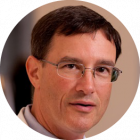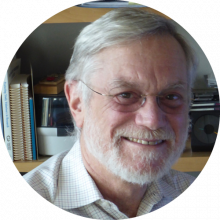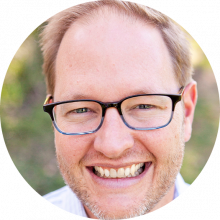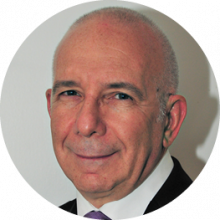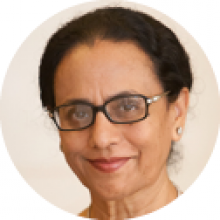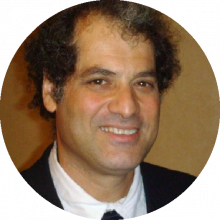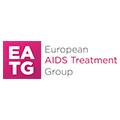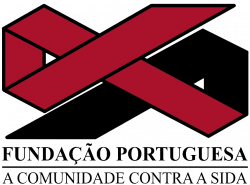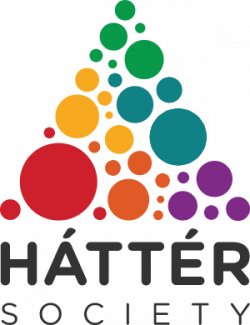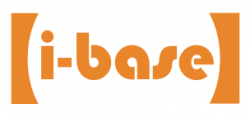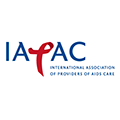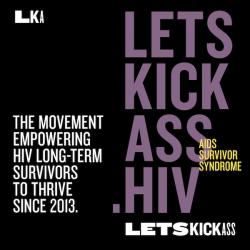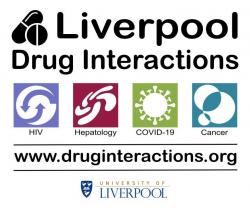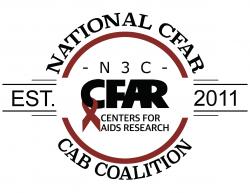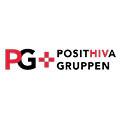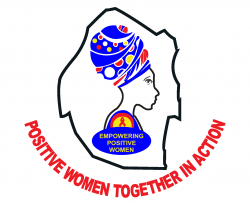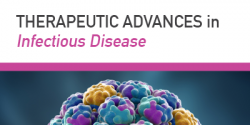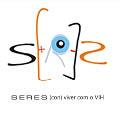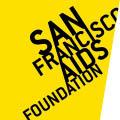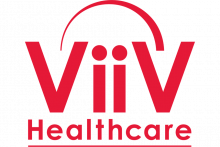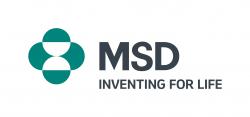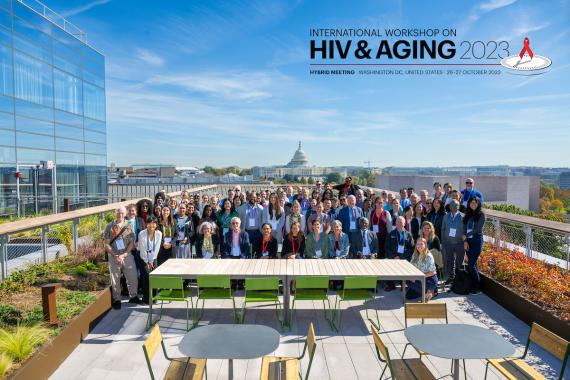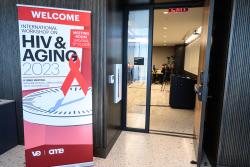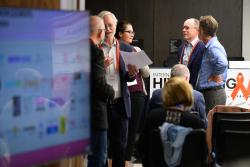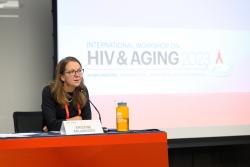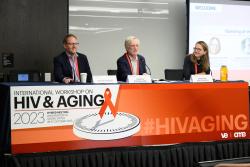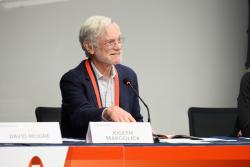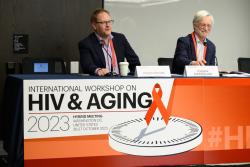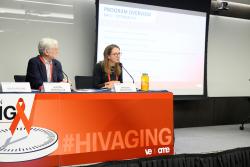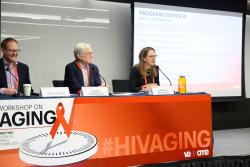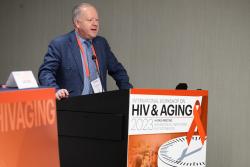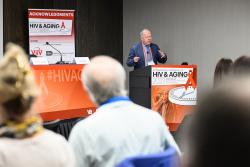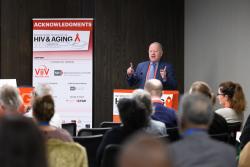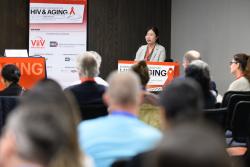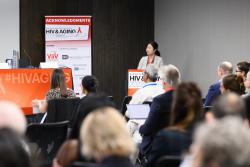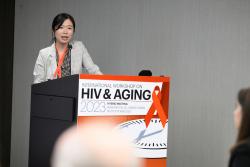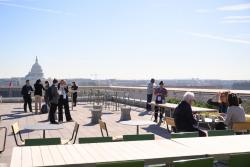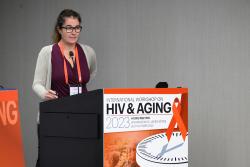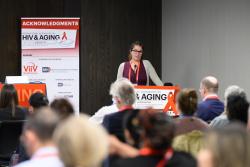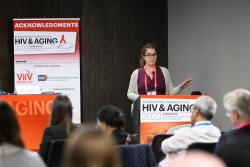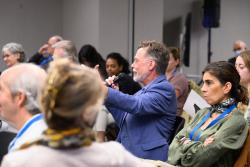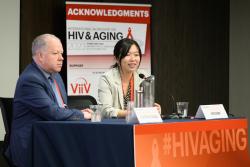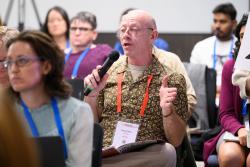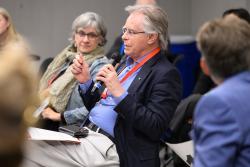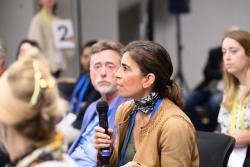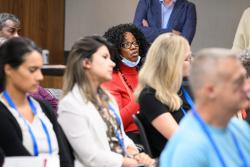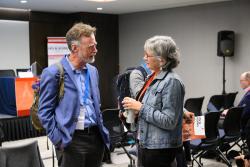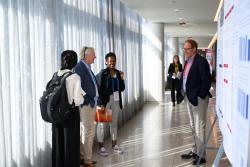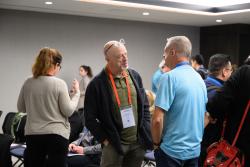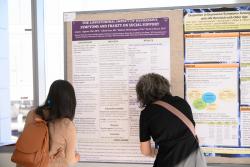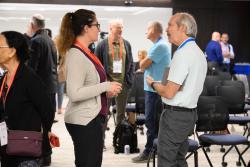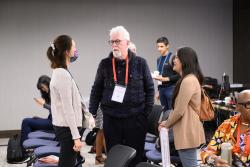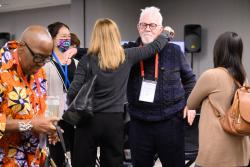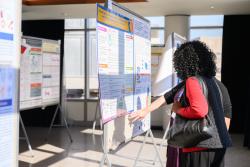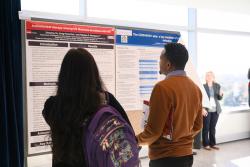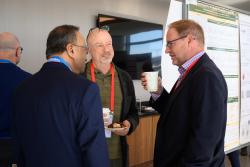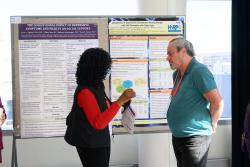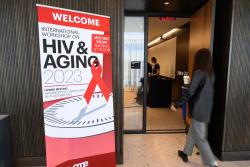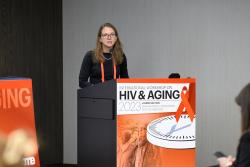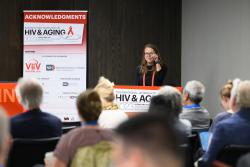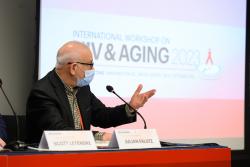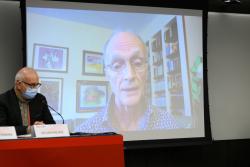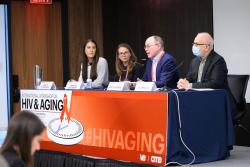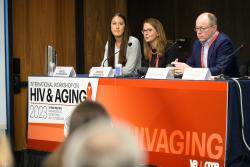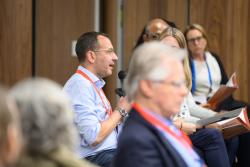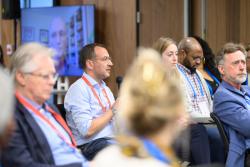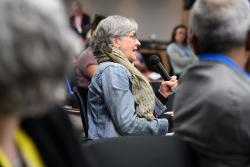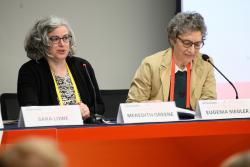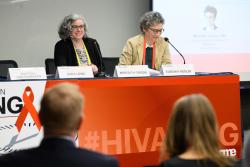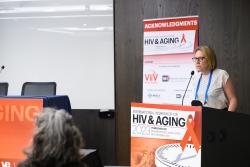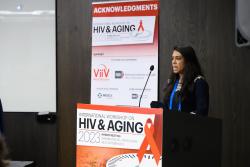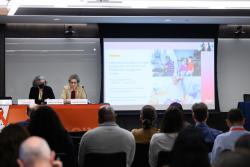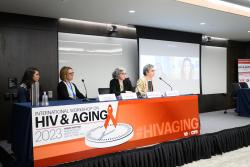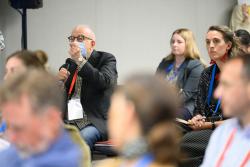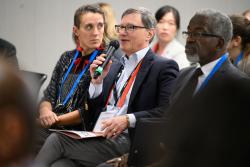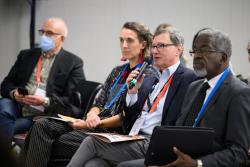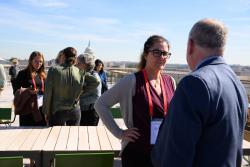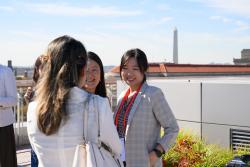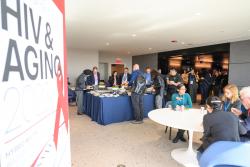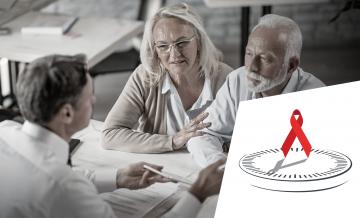The presentation videos and slides for speakers’ lectures are made available, provided that they have granted us permission to do so.
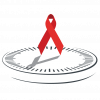
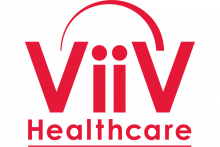
International Workshop on HIV & Aging 2023
Related Enduring Materials
Thursday 26 October
Friday 27 October
Welcome
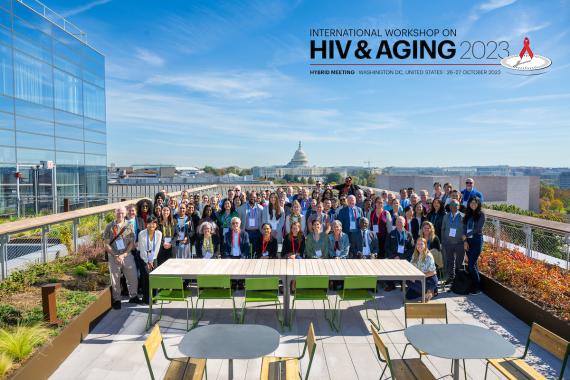
The 14th International Workshop on HIV & Aging took place in a hybrid format from 26-27 October 2023, in Washington DC, United States.
The next edition of the International Workshop on HIV & Aging will take place in Washington DC, on 24-25 October 2024.
The integration of antiretroviral therapy (ART) into HIV care has dramatically extended the life expectancy of those living with HIV. This increased life expectancy is changing the demographics of the HIV epidemic. Currently, over half of individuals living with HIV are aged 50 or older. Recent estimates in Europe suggest that more than 70% of those with HIV will be over the age of 50 by 2030, accompanied by a greater burden of comorbidities and the associated treatments. In comparison to similar populations, persons with HIV, even when on effective ART, experience an excess of morbidity and mortality. Complications due to AIDS are rarely fatal for persons on ART. Instead, patients experience an early onset of aging complications, including neurocognitive decline, osteoporosis and fractures, impaired physical function, frailty, and falls.
Improving the management of older adults with HIV will require a much deeper understanding of the interface between aging, HIV, associated comorbid conditions, and concurrent treatment. Additionally, research is needed to address the unique psychosocial challenges faced by this growing population. The elderly population living with HIV is particularly vulnerable to social stigma, which can lead to depression, psychological distress, compromised adherence to therapy, and overall poor treatment outcomes and quality of life.
The International Workshop on HIV and Aging remains the only platform worldwide for international, cross-disciplinary scientific exchange on the increasingly recognized difficulties encountered in the clinical care and design of studies to improve the care of persons aging with HIV. The meeting gathers (basic) researchers, healthcare professionals across different disciplines, and community advocates to foster dialogue and prompt solutions that will benefit the aging population living with HIV. In addition, the workshop will also create opportunities for trainees and junior investigators to present their research, network, and learn from experts in the field.
General Information
• Interactive roundtable discussions
• Ample time for discussion
- Facilitate an unbiased and scientific knowledge exchange regarding HIV and ageing and encouraging early career investigators to actively take part in the workshop.
- Inform on the current advances in basic and clinical research in HIV and ageing and promote its successful translation to clinical care options.
- Create awareness on challenges regarding the management of older people living with HIV and catalyze research to combat these challenges
- Outline the underlying mechanisms of sarcopenia in older HIV patients.
- Summarize options to manage sarcopenia in ageing people living with HIV
- Describe the role of nutrient metabolism in older HIV patients
- Describe ways to support mental health in ageing people living with HIV
- Outline complications in older HIV patients
- Explain/Reflect on options to manage complications in ageing people living with HIV
Practical Information
Full Address:
555 Pennsylvania Avenue NW
Washington, DC, 20001
United States
Distance from Dulles International Airport : 27.2 miles
Any individual who feels discriminated against, harassed, disrespected, or marginalized is encouraged to report the incident(s) to VE and AME via info@amededu.com or to one of our on-site personnel.
Any participant who is found to have exhibited any inappropriate conduct or behavior against others may be removed from the program.
Please note that payment by credit card is required to be able to register for the workshop. Please contact the conference secretariat if this is not possible for you.
Fees and Conditions
Live Participation
|
Regular Delegates |
Industry* |
|
|
Early Fee (payment before/ on 26 July 2023) |
$475.00 |
$1675.00 |
|
Standard Fee (payment before/ on 22 October 2023) |
$955.00 |
$2155.00 |
|
Onsite Fee / Post-Meeting Fee (payment from 23 October 2023) |
$1195.00 |
$2395.00 |
Virtual Participation
|
Regular Delegates |
Industry* |
|
|
Early Fee (payment before/ on 26 July 2023) |
$237.50 |
$1675.00 |
|
Standard Fee (payment before/ on 22 October 2023) |
$477.50 |
$2155.00 |
|
Onsite Fee / Post-Meeting Fee (payment from 23 October 2023) |
$597.50 |
$2395.00 |
| Discounts | |
|---|---|
| Early-Career Investigators / Academia from Resource-Limited Settings (RLS)* WITH accepted abstract | 100% Discount |
| Early-Career Investigators / Academia from Resource-Limited Settings (RLS)* WITHOUT accepted abstract | 50% Off Current Academia Fee |
| NGO Representatives / Government Representatives (i.e. MOH, NIH, NIAID, etc.) / Advocates | 50% Off Current Academia Fee |
| Members of Endorsers | 25% Off Current Academia Fee |
| Sponsors | Contact Secretariat |
| People Living with HIV | 100% Discount |
*Countries included in the low-income and middle-income economies list of the World Bank Classification
Important
-
We strongly advise that you register early to ensure your registration. Registration will close when the capacity of the venue is reached.
-
Submission of your online registration does not guarantee that your registration has been accepted. Your registration is final when full prepayment has been received and a confirmation of your registration has been sent.
- All presentation materials as well as recordings 3 weeks after the event.
IMPORTANT: Complimentary registration is offered to the presenting author only.
To be eligible as an early-career investigator, one should either be a current Master/PhD student or have obtained an MD/PharmD/PhD degree in the last five years. An application form needs to be completed by a supervisor and received by the Virology Education secretariat at least two weeks prior to the start of the workshop. Virology Education will contact the early-career investigator with instructions regarding the registration procedure.
- Cancellation before/on 26 September 2023: 50% refund (minus an administration fee of $40)
- Cancellation after 26 September 2023: Unfortunately, no refund will be given
If you are unable to attend the workshop, a substitute delegate is always welcome at no extra charge, provided that a letter of authorization from the original participant has been received and the workshop secretariat has been notified of the name of the substitute delegate before 12 October 2023. A statement (email/letter) of cancellation must be sent to Virology Education.
1. Proof of accreditation
2. Valid identification (e.g. passport)
3. A letter from your assignment giver stating the details of your assignment (e.g. editor)
4. At least 3 previous written assignments in recognized outlets on HIV. If you are a freelance journalist, the assignments can be from different (recognizable) news outlets. Links to online publications are accepted
5. The website of the publication(s)/blog(s) that will be featuring your story on this workshop
A complimentary or reduced registration fee may apply for accredited media participants depending on availability. Preference will be given to credible print and online news sources. Please contact the workshop secretariat for registration conditions.
We would like to receive a copy of your workshop report/ article once it is finalized.
All credentials will be verified by the Organizing Committee of the Workshop. Media representatives are kindly requested to register by sending the above-mentioned information to info@amededu.com.
Important: Media is restricted to the written press. Recording on film or photo is not allowed. Virology Education will request a copy of the written piece once it is finalized. Media representatives must also agree to abide by the 2023 embargo policy.
The members of the Organizing Committee are a group of carefully selected experts and inspirational leaders in their respective fields. They meet frequently to discuss the scientific program of the workshop, identify interesting topics and candidate speakers, and review all submitted abstracts.
Scientific Committee
The members of Scientific Committee are hand-picked by the Organizing Committee (OC) and the conference secretariat based on their significant contributions and commitment to the field. They assist the OC by providing them with suggestions for speakers and topics. In addition, members of the Scientific Committee participate in reviewing submitted abstracts, and play an active role during the workshop as moderators and/or chairs of sessions.
- Dorcas Baker, RN, BSN, ACRN, MA, Johns Hopkins University School of Nursing, MidAtlantic AIDS Education and Training Center (AETC), United States
- Bruce Brew, MD, St Vincent's Hospital, Australia
- Marie-Josée Brouillette, MD, McGill University Health Centre, Canada
- Simon Collins, HIV i-Base, United Kingdom
- Daniel Duprez, MD, University of Minnesota (Cardiology), United States
- Giovanni Guaraldi, MD, Policlinico Modena, Italy
- Jordan Lake, MD, MSc, UTHealth, United States
- Alan Landay, PhD, Rush University Medical Center, United States
- Catia Marzolini, PharmD, PhD, University Hospital Basel, Switzerland
- Eugènia Negredo, MD, PhD, Universitat Autònoma de Barcelona , Spain
- Kelly O'Brien, PhD, BScPT, BSc, University of Toronto, Department of Physical Therapy, Canada
- Brendan Payne, PhD, Newcastle University, United Kingdom
- Molly Perkins, PhD, Emory University School of Medicine, United States
- Matilde Sanchez Conde, MD, PhD, Hospital Ramón y Cajal, Spain
- Eugenia Siegler, MD, Weill Cornell Medicine, United States
- Jeff Taylor, HIV + Aging Research Project - Palm Springs, United States
- Phyllis Tien, MD, MSc, University of California - San Francisco, United States
- Cara Wilson, MD, University of Colorado, United States
Industry LIaison Board
The Industry Liaison Board, consisting of leading medical scientists of the pharmaceutical industry, is asked to give input and suggestions that help the Organizing Committee in planning the workshop and providing support on topics of interest and innovative suggestions to optimize audience participation. The Industry Liaison Board assists the Organizing Committee by suggesting the most current and critical topics to bring the audience up-to-date on the most current research in the pharmaceutical industry in related disciplines.
- Andrew Clark, MD, ViiV Healthcare, United Kingdom
- Richard Haubrich, MD, Gilead Sciences, United States
- Christian Marsolais, PhD, Theratechnologies, Canada
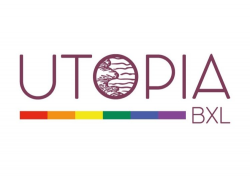
Endorsers
HIV & Aging 2023 is endorsed by societies and organizations. Their support and collaboration are key to the success of this workshop!
A 25% discount on the academia registration fee is offered to members/employees of endorsers. Please reach out to your organization to obtain the applicable discount code.
If you would like your organization to endorse this workshop, please contact Christina Moustakaki at Christina.Moustakaki@amededu.com

Supported by an educational grant from Janssen Therapeutics, Division of Janssen Products, LP
__________________________________________________________________________
Support Our Initiative
Support Our Initiative
Financial backing helps us deliver an impactful meeting experience to the benefit of healthcare professionals and researchers interested in International Workshop on HIV & Aging 2023.
This collaboration plays a vital role in both the organizational as well as scientific success of the program.
To show your commitment to the cause, get in touch with us for a tailored
support package by contacting Ms. Lara da Silva Miguel at Lara@amededu.com.
Benefits of Support
By supporting this program, we can offer the following advantages for your company.* Please contact us for the most recent support level benefits for this program.
- Symposium opportunities
- Non-commercial interviews with company representatives
- Verbal acknowledgement during the program
- Discounted and complimentary registrations for your representatives
- Company acknowledgement on digital meeting materials including but not limited to newsletters, flyers, the streaming platform, and our website
- Company acknowledgement on printed meeting materials including but not limited to banners and the program book
- Digital and printed advertising opportunities
- Social media shout-outs
- Logo on the conference bag
*Subject to the support level.
We look forward to welcoming you to Washington DC!
As you plan your trip to Washington DC, we want to make your stay as comfortable and convenient as possible. Therefore, we are pleased to offer to all participants of HIV & Aging 2023 some accommodation options near the workshop venue.
To benefit from a special discount on the best available rates, please book your accommodation through the following links.
Previous Editions
- 13th Edition - International Workshop on HIV & Aging, 2022, Virtual
- 12th Edition - International Workshop on HIV & Aging, 2021, Virtual
- 11th Edition - International Workshop on HIV & Aging, 2020, Virtual
- 10th Edition - International Workshop on HIV & Aging, 2019, United States
- 9th Edition - International Workshop on HIV & Aging, 2018 United States
- 8th Edition - International Workshop on HIV & Aging, 2017, United States
- 7th Edition - International Workshop on HIV & Aging, 2016, United States
Reports
- High Proportion of People With HIV 80 or Older Remain Independent - Mark Mascolini
-
Cognitive Frailty Threatens People With HIV at a Younger Age - Mark Mascolini
-
DTG Linked to Depression—But Not in People Under 60, Black, or on Antidepressants - Mark Mascolini
-
Cognitive Function Fell in 25% Over 10 Years in Canadian Group With HIV - Mark Mascolini
-
Age Over 69, More Comorbidities Mean Lower Chance of ART With Medicare - Mark Mascolini
-
Depression—But Not Frailty—Tied to Waning Social Support With HIV - Mark Mascolini
-
Some Depressive Symptoms Wane With Age in Group With HIV—Some Do Not - Mark Mascolini
-
Emotional (but not Social) Loneliness Tied to Cognition in Older People With HIV - Mark Mascolini
-
Clustering Frailty Components May Enable Sharper Comorbidity Insights - Mark Mascolini
-
Plasma Proteome Offers Insights Beyond Traditional CVD Risk Factors - Mark Mascolini
-
High Rate of Metabolic Comorbidities in Young Adults With HIV Acquired Around Birth - Mark Mascolini
-
Where You Live Tied to Frailty Rate in Older People With HIV - Mark Mascolini







